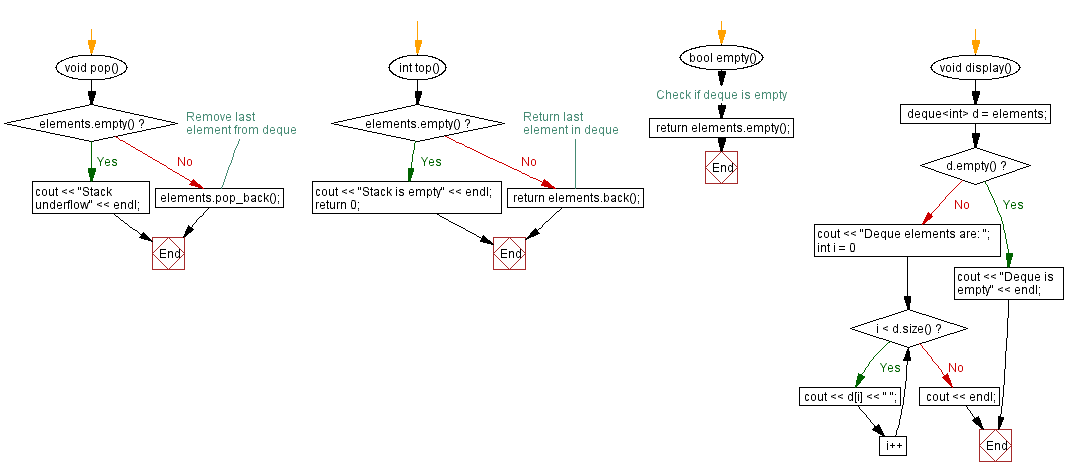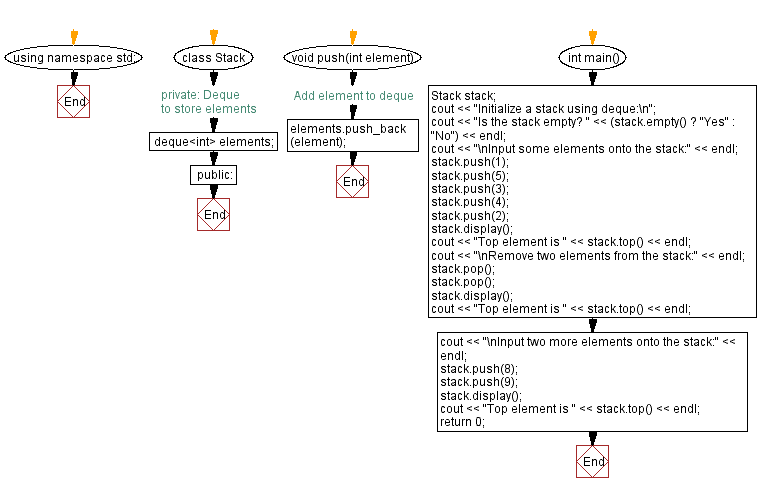C++ Stack Exercises: Implement a stack using a Deque with push, pop operations
28. Implement Stack using Deque with Push, Pop, and Top Check
Write a C++ program to implement a stack using a Deque with push and pop operations. Check if the stack is empty or not and find the top element of the stack.
Test Data:
Initialize a stack using deque:
Is the stack empty? Yes
Input some elements onto the stack:
Deque elements are: 1 5 3 4 2
Top element is 2
Sample Solution:
C++ Code:
#include <iostream>
#include <deque>
using namespace std;
class Stack {
private:
deque<int> elements; // Deque to store elements
public:
// Function to add an element to the stack
void push(int element) {
elements.push_back(element); // Add element to deque
}
// Function to remove an element from the stack
void pop() {
if (elements.empty()) {
cout << "Stack underflow" << endl; // Display underflow message if deque is empty
} else {
elements.pop_back(); // Remove last element from deque
}
}
// Function to get the top element of the stack
int top() {
if (elements.empty()) {
cout << "Stack is empty" << endl; // Display empty message if deque is empty
return 0;
} else {
return elements.back(); // Return last element in deque
}
}
// Function to check if the stack is empty
bool empty() {
return elements.empty(); // Check if deque is empty
}
// Function to display the elements in the stack
void display() {
deque<int> d = elements;
if (d.empty()) {
cout << "Deque is empty" << endl; // Display empty message if deque is empty
return;
}
cout << "Deque elements are: ";
for (int i = 0; i < d.size(); i++) {
cout << d[i] << " "; // Display the elements in the deque
}
cout << endl;
}
};
int main() {
Stack stack;
cout << "Initialize a stack using deque:\n"; // Initialize a stack
cout << "Is the stack empty? " << (stack.empty() ? "Yes" : "No") << endl;
cout << "\nInput some elements onto the stack:" << endl;
stack.push(1);
stack.push(5);
stack.push(3);
stack.push(4);
stack.push(2);
stack.display();
cout << "Top element is " << stack.top() << endl;
cout << "\nRemove two elements from the stack:" << endl;
stack.pop();
stack.pop();
stack.display();
cout << "Top element is " << stack.top() << endl;
cout << "\nInput two more elements onto the stack:" << endl;
stack.push(8);
stack.push(9);
stack.display();
cout << "Top element is " << stack.top() << endl;
return 0;
}
Sample Output:
Initialize a stack using deque: Is the stack empty? Yes Input some elements onto the stack: Deque elements are: 1 5 3 4 2 Top element is 2 Remove two elements from the stack: Deque elements are: 1 5 3 Top element is 3 Input two more elements onto the stack: Deque elements are: 1 5 3 8 9 Top element is 9
Flowchart:


For more Practice: Solve these Related Problems:
- Write a C++ program to simulate stack operations using a deque and check for emptiness before each pop.
- Develop a C++ program that implements a stack with a deque and displays the top element after every operation.
- Design a C++ program to create a stack using a deque and validate its state (empty/full) during push/pop operations.
- Implement a C++ program to manage a stack using a deque, ensuring efficient push and pop while displaying the top element.
Go to:
PREV : Find the Middle Element(s) of a Vector-Based Stack.
NEXT : Sort the Elements of a Deque-Based Stack.
CPP Code Editor:
Contribute your code and comments through Disqus.
What is the difficulty level of this exercise?
